
Ethnologia Scandinavica
metrics 2024
Navigating the Cultural Dynamics of the North
Introduction
Ethnologia Scandinavica is a distinguished journal published by Swedish Science Press, dedicated to advancing the field of Scandinavian ethnology and cultural studies. With its ISSN 0348-9698, this journal has become an important platform for original research that explores the rich tapestry of cultural practices, traditions, and social dynamics within Scandinavian societies. Although not currently available through open access, the journal provides valuable insights that are often utilized by researchers, professionals, and students alike. Since its inception in 1984, Ethnologia Scandinavica has fostered scholarly discourse and serves as a crucial resource for those looking to deepen their understanding of ethnological perspectives in Scandinavia. Staying abreast of contemporary cultural issues and historical contexts, this journal plays an essential role in promoting academic inquiry and preserving the invaluable cultural heritage of the region.
Metrics 2024
 -
- 0.20
0.20 0.20
0.20 -
-Metrics History
Rank 2024
JCI (Web Of Science)
Quartile History
Similar Journals
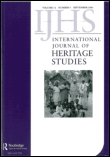
International Journal of Heritage Studies
Illuminating the intersections of culture and heritage.Welcome to the International Journal of Heritage Studies, a prestigious publication dedicated to advancing knowledge in the fields of heritage conservation, cultural studies, and museology. Published by Routledge Journals, Taylor & Francis Ltd in the United Kingdom, this journal boasts an impressive impact ranking, positioned in the Q1 category for multiple disciplines, including Conservation and Cultural Studies, and a remarkable HIndex indicative of its influence within academia. With a history spanning from 1994 and continuing to 2024, the journal serves as an essential platform for researchers, professionals, and students aiming to contribute to the dynamic discourse surrounding heritage preservation and cultural management. Although the journal does not offer open access, it remains a vital resource for those interested in the nuanced intersections of heritage and society, as evidenced by its high ranks in various academic categories. The International Journal of Heritage Studies is committed to fostering innovative research and critical analysis in its field, inviting submissions that explore diverse methodologies and theoretical perspectives.
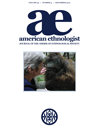
AMERICAN ETHNOLOGIST
Navigating the Complexities of Social PracticesAMERICAN ETHNOLOGIST, published by Wiley, stands as a prominent platform in the field of anthropology, with a distinguished reputation underscored by its Q1 ranking in the 2023 Category Quartiles and a notable position in the 79th percentile among its peers. With its foundation dating back to 1974 and set to continue until 2024, this journal serves as a vital resource for researchers, practitioners, and students devoted to exploring cultural dynamics and social practices across diverse communities. The journal is characterized by its commitment to advancing theoretical discussions and empirical scholarship in ethnology and related disciplines. Targeted contributions include in-depth studies, critical reviews, and innovative methodologies that engage with pressing cultural issues. Although it does not offer Open Access, the journal’s rigorous peer-review process and high-impact articles ensure the dissemination of valuable insights, enhancing scholarly engagement and professional discourse. Its ISSN is 0094-0496 and E-ISSN is 1548-1425, emphasizing its dual format accessibility, which facilitates wider readership within the anthropology community.
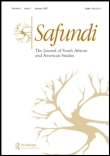
Safundi
Illuminating Cultural Dynamics and Historical ContextsSafundi, published by Routledge Journals, Taylor & Francis Ltd, is a distinguished peer-reviewed journal dedicated to exploring the intersections of culture, history, and political science. Since its inception in 2000, Safundi has contributed significantly to the discourse on cultural studies, positioning itself as a vital resource for researchers and professionals alike. With an Impact Factor reflective of its rigorous scholarship, the journal is ranked in the top quartiles for cultural studies and history, showcasing its influence and authority within these fields. The journal addresses critical contemporary issues, aiming to foster a nuanced understanding of cultural dynamics and historical contexts. While access options are traditional, Safundi remains committed to disseminating pivotal research that resonates with academics and policymakers. As it continues to evolve through to 2024, Safundi serves as an indispensable platform for students and scholars seeking to contribute to the vibrant dialogue surrounding culture and its implications in our global society.
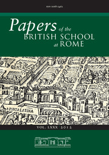
Papers of the British School at Rome
Connecting Scholars Through the Lens of Roman HeritagePapers of the British School at Rome, published by Cambridge University Press, is a prestigious journal that has been contributing to the fields of archaeology, history, and visual arts since its inception in 1902. With an ISSN of 0068-2462 and an E-ISSN of 2045-239X, this journal serves as an essential platform for innovative research and scholarly dialogue that explores the rich cultural heritage of Rome and its surrounding areas. The journal is ranked in the top quartiles for various categories, including Q1 in Visual Arts and Performing Arts, reflecting its significant impact and relevance in these fields. Despite its non-open access status, the journal boasts a robust readership, comprising researchers, professionals, and students eager to delve into the scholarly discussions it fosters. The Scopus rankings further affirm its reputation, with high percentiles in key areas, marking it as a vital resource for anyone invested in the academic study of classical and contemporary Roman culture. The journal's objective is to promote interdisciplinary research, making it a cornerstone for advancements in art history and archaeological studies.
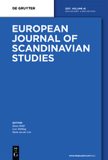
European Journal of Scandinavian Studies
Exploring the rich tapestry of Scandinavian cultures.European Journal of Scandinavian Studies is an esteemed journal published by Walter de Gruyter GmbH, dedicated to advancing scholarship in the fields of Cultural Studies, Linguistics and Language, and Literature and Literary Theory. Since its inception in 2010, the journal has been a pivotal platform for researchers and scholars, showcasing cutting-edge research and critical discussions pertaining to Scandinavian languages and cultures. With an ISSN of 2191-9399 and an E-ISSN of 2191-9402, the journal emphasizes accessibility to impactful academic work, despite its current non-open access model. While the journal is categorized within the Q4 quartile for Cultural Studies and Linguistics/Language, it has shown notable potential in ranking higher in its specialized domains, fostering a growing community of researchers invested in Scandinavian studies. The journal's office is located in Berlin, Germany, further enriching its European scholarly context. As it continues to evolve, the European Journal of Scandinavian Studies serves as a vital resource for academics seeking to engage deeply with the multifaceted aspects of Scandinavian culture and linguistics.
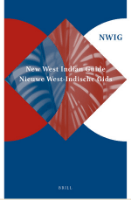
NWIG-New West Indian Guide-Nieuwe West-Indische Gids
Unveiling the Rich Tapestry of Caribbean Society and History.NWIG-New West Indian Guide-Nieuwe West-Indische Gids is a prestigious academic journal published by KITLV PRESS in the Netherlands, dedicated to advancing knowledge in the realms of history, cultural studies, and social sciences. Established in 1977, the journal has consistently provided a platform for scholarly discourse, focusing on the Caribbean and its multifaceted histories, cultures, and societies. With an Open Access model adopted since 2013, it ensures widespread dissemination of critical research that appeals to a diverse academic audience. In 2023, the journal has been recognized with notable quartiles, ranking in Q2 for both cultural studies and history, underscoring its significance in the field. Researchers and students alike can benefit from its vast collection of articles exploring important themes relevant to the Caribbean context and beyond, fostering a deeper understanding of the region's impact on global narratives. For a comprehensive and enriching scholarly experience, NWIG invites submissions that push the boundaries of current knowledge and encourage interdisciplinary engagement.
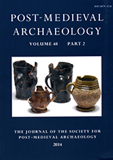
Post-Medieval Archaeology
Revealing the Rich Tapestry of Post-Medieval LifePost-Medieval Archaeology is a distinguished academic journal published by ROUTLEDGE JOURNALS, TAYLOR & FRANCIS LTD, focusing on the rich tapestry of human history from the post-medieval period through the lens of archaeology. With a proud publication history spanning since 1967, this journal addresses the integration of archaeological findings with historical narratives, contributing significantly to the field of archaeology and history. The journal holds an impressive categorization within the Q2 and Q3 quartiles for Archaeology and History in 2023, showcasing its commitment to academic excellence and relevance within these disciplines. Researchers and professionals alike will find value in its critical examinations and innovative methodologies that illuminate the past, making it a pivotal resource for those engaged in archaeological research. As an essential platform for scholarly debate and dissemination, Post-Medieval Archaeology continues to advance the understanding of post-medieval contexts and material culture, fostering discussions that resonate through various areas of the arts, humanities, and social sciences.
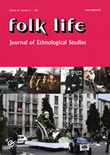
Folk Life-Journal of Ethnological Studies
Celebrating Cultural Diversity through Rigorous Scholarship.Welcome to the Folk Life-Journal of Ethnological Studies, a distinguished publication devoted to exploring the rich tapestry of human culture and ethnological research. Published by Routledge Journals, Taylor & Francis Ltd, this journal serves as an essential platform for scholars and practitioners within the fields of Anthropology, Arts and Humanities, and Cultural Studies. With a publication history stretching back to 1963, the journal has become a valuable resource for disseminating innovative and interdisciplinary research, contributing to a deeper understanding of diverse cultural phenomena. Despite its current quartile rankings of Q4 across multiple categories, 'Folk Life' continues to strive for academic excellence and encourages submissions that challenge existing narratives and offer fresh perspectives. Although not open access, articles published in this journal are rigorously peer-reviewed, ensuring the highest scholarly standards. Researchers, professionals, and students alike will find rigorous and thought-provoking studies within its pages, making Folk Life an important fixture in the academic landscape.

Journal of Urban Ethnology
Unveiling the Rich Tapestry of City LifeJournal of Urban Ethnology, published by the Polish Academy of Sciences, Institute of Archaeology & Ethnology, is a premier scholarly journal focused on the multifaceted dimensions of urban life through an ethnographic lens. With a commitment to advancing the field of urban studies, this journal welcomes original research articles, case studies, and theoretical discussions that explore the rich tapestry of urban communities, cultural practices, and social dynamics. The journal plays a crucial role in fostering interdisciplinary dialogue among anthropologists, sociologists, urban planners, and cultural researchers, making it an invaluable resource for professionals, students, and scholars alike. While it currently operates under a traditional access model, the journal strives to contribute to an understanding of contemporary urban challenges and innovations, supporting the quest for sustainable and equitable urban futures. The ISSN for the journal is 1429-0618, ensuring its recognition in global academic databases.

Chungara-Revista de Antropologia Chilena
Illuminating the Past and Present of Chilean SocietiesChungara-Revista de Antropologia Chilena is a premier academic journal dedicated to the field of anthropology, showcasing research and discourse that emphasize the rich cultural heritage of Chile and its surrounding regions. Published by UNIV TARAPACA, this journal serves as a vital platform for scholars, researchers, and students keen on exploring anthropological studies, ethnographic fieldwork, and cultural analysis. With an ISSN of 0717-7356, it adheres to rigorous academic standards and strives to promote open dialogue on contemporary and historical issues across various communities. Although currently not indexed in prominent metrics, its commitment to scholarly excellence contributes significantly to the academic landscape, fostering a deeper understanding of anthropological practices in Chile and beyond. Authors are encouraged to engage with the journal's rich repository of knowledge while readers gain access to pivotal insights that drive forward the discourse within anthropology.